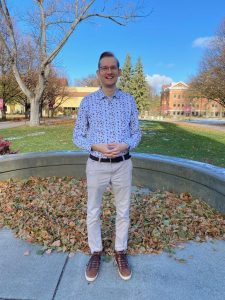On a warm day in August, Alexander Beard gathers with his friends at a national park in Germany. After a full day of playing frisbee and chatting, everyone sits down for a final picnic before Beard heads to the United States on a foreign exchange program. There’s obvious apprehension, since the setting of their goodbyes was chosen specifically to follow COVID guidelines. Nevertheless, two days after the picnic Beard was well on his way to school in the United States.
Whether it’s the inability to visit family on breaks or the insecurity of participating in foreign exchange programs at all, international students face a whole new level of uncertainty during the pandemic. Their experiences in the U.S. differ greatly from past students, whether it’s through a positive or negative light.

Beard moved to Concordia College in August, on an exchange program sponsored by The Federation of German American Clubs. He chose a more unpopular stance on studying abroad too–according to the National Association of Foreign Student Advisors, US higher education has lost almost $700 million from shortened or canceled study abroad programs during the Fall 2020 semester.
Studying in the U.S. has presented more pros than cons for Beard, especially during the pandemic. In Germany, Beard’s university closed all on-campus housing. Online learning was also integrated into the academic schedule too quickly during the Spring 2020 semester, resulting in a messy handling of online classes.
Beard has also benefited from the way American colleges function. Despite the prevalence of COVID, Beard has been able to participate in Concordia’s German club. In Germany, campuses don’t provide access to activities and clubs, they just provide rooms and libraries for the clubs to meet. Unfortunately, this is where COVID has taken its toll.
“What falls flat in my experience is all the non-study related stuff on campus,” Beard says.
Instead of cultivating bonds similar to those he had in Germany, Beard finds himself confined to his apartment instead of playing frisbee with new friends out on campus.
While Beard has benefited from the community on the Concordia campus, not being able to be more involved in the German club has left his study abroad experience somewhat lacking.
But Beard and his friends on campus have found ways to make the most of the year Beard is in the United States. “If the obvious (activity) isn’t possible we can always figure out how to spend our time,” he says. Socially distanced gatherings in his on campus apartment and activities outside are just a few of the things Beard does with his American friends.
Beard’s family, however, holds a different philosophy on his study abroad experience. When Beard approached them with his plans for the 2020-2021 school year, “their first reaction
was asking me ‘are you mad?’” says Beard. His family was concerned about the COVID-19 case count in the U.S.
While Beard has only been away from his family since August, Concordia freshman Lutricia Zambezi hasn’t been home to Malawi in a year and two months. While not a part of a foreign exchange program, as an international student Zambezi has had her fair share of struggles.

Zambezi didn’t have a going-away get together before she left home over a year ago, but she has had the opportunity to build more relationships with people in the U.S. Living in the dorms on campus, Zambezi frequently hangs out with the girls on her floor, and she gets meals with all of her friends–only when the menu for that day is good though, she says.
Similarly to Beard, Zambezi sees more positives than negatives to attending school in the U.S. “(Malawi doesn’t) have the technology the U.S. has, and you have a lot of really good schools in every state unlike the few Malawi has for the whole country,” she says.
But being away from family for so long has taken its toll. When travel bans were announced, Zambezi recalls being terrified because while she attended high school in Norway she found herself getting tired of not being able to see her family very often.
Despite this, her family was supportive of her decision to attend Concordia. “It is a great opportunity for me to study here, so my family is proud and happy for me,” she says.
Zambezi also says that her friends have helped make her distance from her family a little more bearable. She doesn’t feel trapped in the way that Beard does, being directly on campus in the dorm buildings has given Zambezi the ability to spontaneously drop in on her friends when she’s feeling isolated.
While both Beard and Zambezi have had varying experiences studying in a country foreign to them, overall their experience going to school in the U.S. during the pandemic has been positive. It’s a difficult time for any student, but especially for international students who are unable to maintain a physical connection to their friends and family. But Beard and Zambezi both recognize that there is an entire generation of college students who are missing out on key experiences.

